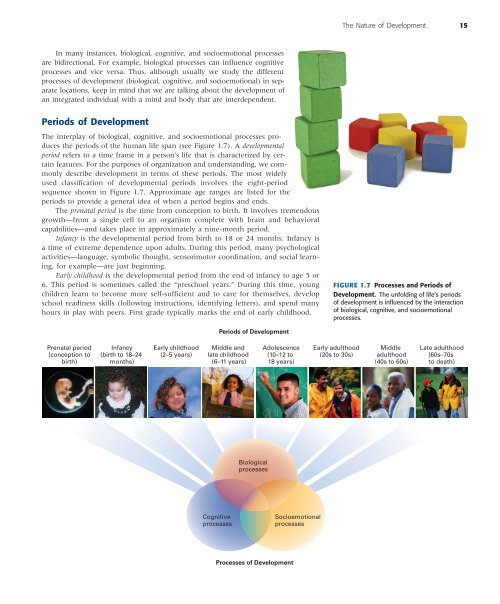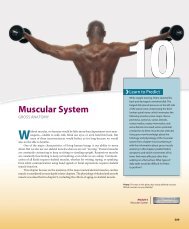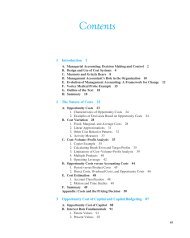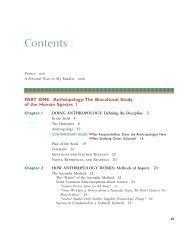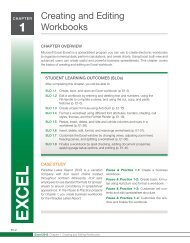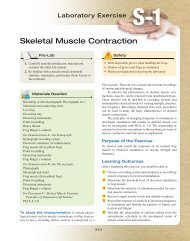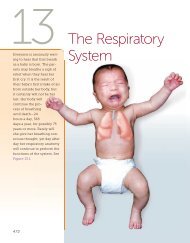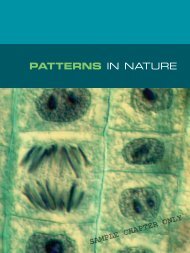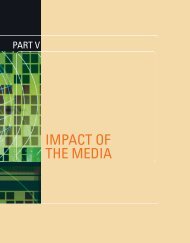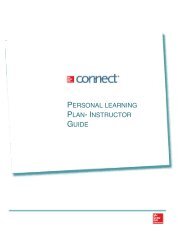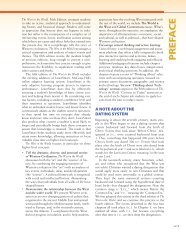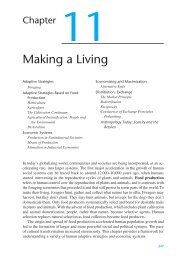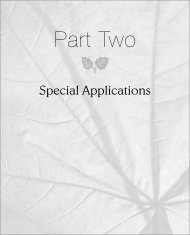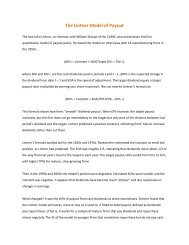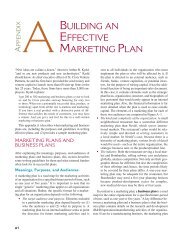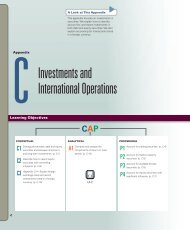Research in Life-Span Development
Research in Life-Span Development
Research in Life-Span Development
You also want an ePaper? Increase the reach of your titles
YUMPU automatically turns print PDFs into web optimized ePapers that Google loves.
In many <strong>in</strong>stances, biological, cognitive, and socioemotional processes<br />
are bidirectional. For example, biological processes can <strong>in</strong>fl uence cognitive<br />
processes and vice versa. Thus, although usually we study the different<br />
processes of development (biological, cognitive, and socioemotional) <strong>in</strong> separate<br />
locations, keep <strong>in</strong> m<strong>in</strong>d that we are talk<strong>in</strong>g about the development of<br />
an <strong>in</strong>tegrated <strong>in</strong>dividual with a m<strong>in</strong>d and body that are <strong>in</strong>terdependent.<br />
Periods of <strong>Development</strong><br />
The <strong>in</strong>terplay of biological, cognitive, and socioemotional processes produces<br />
the periods of the human life span (see Figure 1.7 ). A developmental<br />
period refers to a time frame <strong>in</strong> a person’s life that is characterized by certa<strong>in</strong><br />
features. For the purposes of organization and understand<strong>in</strong>g, we commonly<br />
describe development <strong>in</strong> terms of these periods. The most widely<br />
used classifi cation of developmental periods <strong>in</strong>volves the eight- period<br />
sequence shown <strong>in</strong> Figure 1.7. Approximate age ranges are listed for the<br />
periods to provide a general idea of when a period beg<strong>in</strong>s and ends.<br />
The prenatal period is the time from conception to birth. It <strong>in</strong>volves tremendous<br />
growth—from a s<strong>in</strong>gle cell to an organism complete with bra<strong>in</strong> and behavioral<br />
capabilities—and takes place <strong>in</strong> approximately a n<strong>in</strong>e-month period.<br />
Infancy is the developmental period from birth to 18 or 24 months. Infancy is<br />
a time of extreme dependence upon adults. Dur<strong>in</strong>g this period, many psychological<br />
activities—language, symbolic thought, sensorimotor coord<strong>in</strong>ation, and social learn<strong>in</strong>g,<br />
for example—are just beg<strong>in</strong>n<strong>in</strong>g.<br />
Early childhood is the developmental period from the end of <strong>in</strong>fancy to age 5 or<br />
6. This period is sometimes called the “preschool years.” Dur<strong>in</strong>g this time, young<br />
children learn to become more self-suffi cient and to care for themselves, develop<br />
school read<strong>in</strong>ess skills (follow<strong>in</strong>g <strong>in</strong>structions, identify<strong>in</strong>g letters), and spend many<br />
hours <strong>in</strong> play with peers. First grade typically marks the end of early childhood.<br />
Prenatal period<br />
(conception to<br />
birth)<br />
Infancy<br />
(birth to 18–24<br />
months)<br />
Early childhood<br />
(2–5 years)<br />
Cognitive<br />
processes<br />
Periods of <strong>Development</strong><br />
Middle and<br />
late childhood<br />
(6–11 years)<br />
Biological<br />
processes<br />
Adolescence<br />
(10–12 to<br />
18 years)<br />
Processes of <strong>Development</strong><br />
Socioemotional<br />
processes<br />
The Nature of <strong>Development</strong> 15<br />
FIGURE 1.7 Processes and Periods of<br />
<strong>Development</strong>. The unfold<strong>in</strong>g of life’s periods<br />
of development is <strong>in</strong>fl uenced by the <strong>in</strong>teraction<br />
of biological, cognitive, and socioemotional<br />
processes.<br />
Early adulthood<br />
(20s to 30s)<br />
Middle<br />
adulthood<br />
(40s to 60s)<br />
Late adulthood<br />
(60s–70s<br />
to death)


